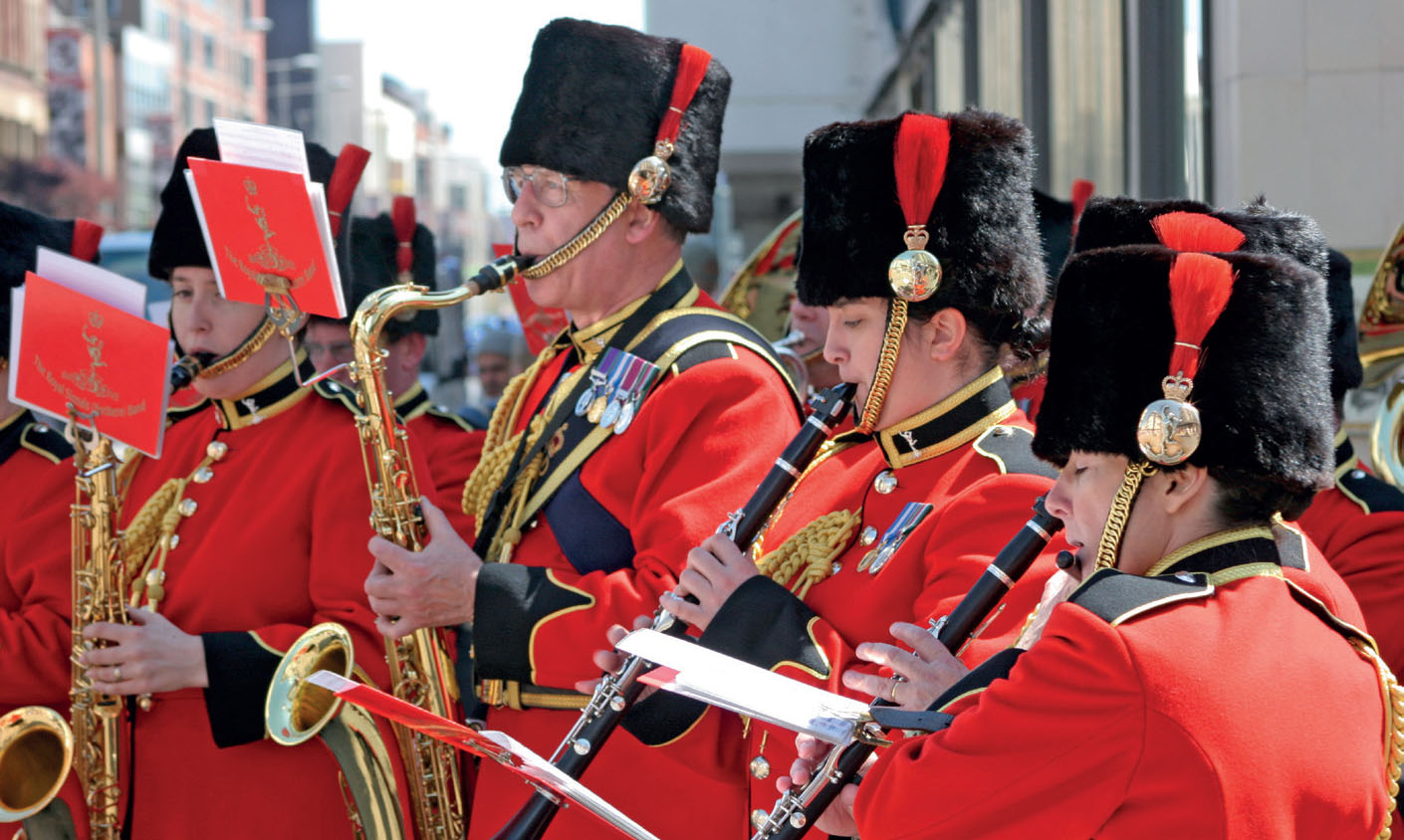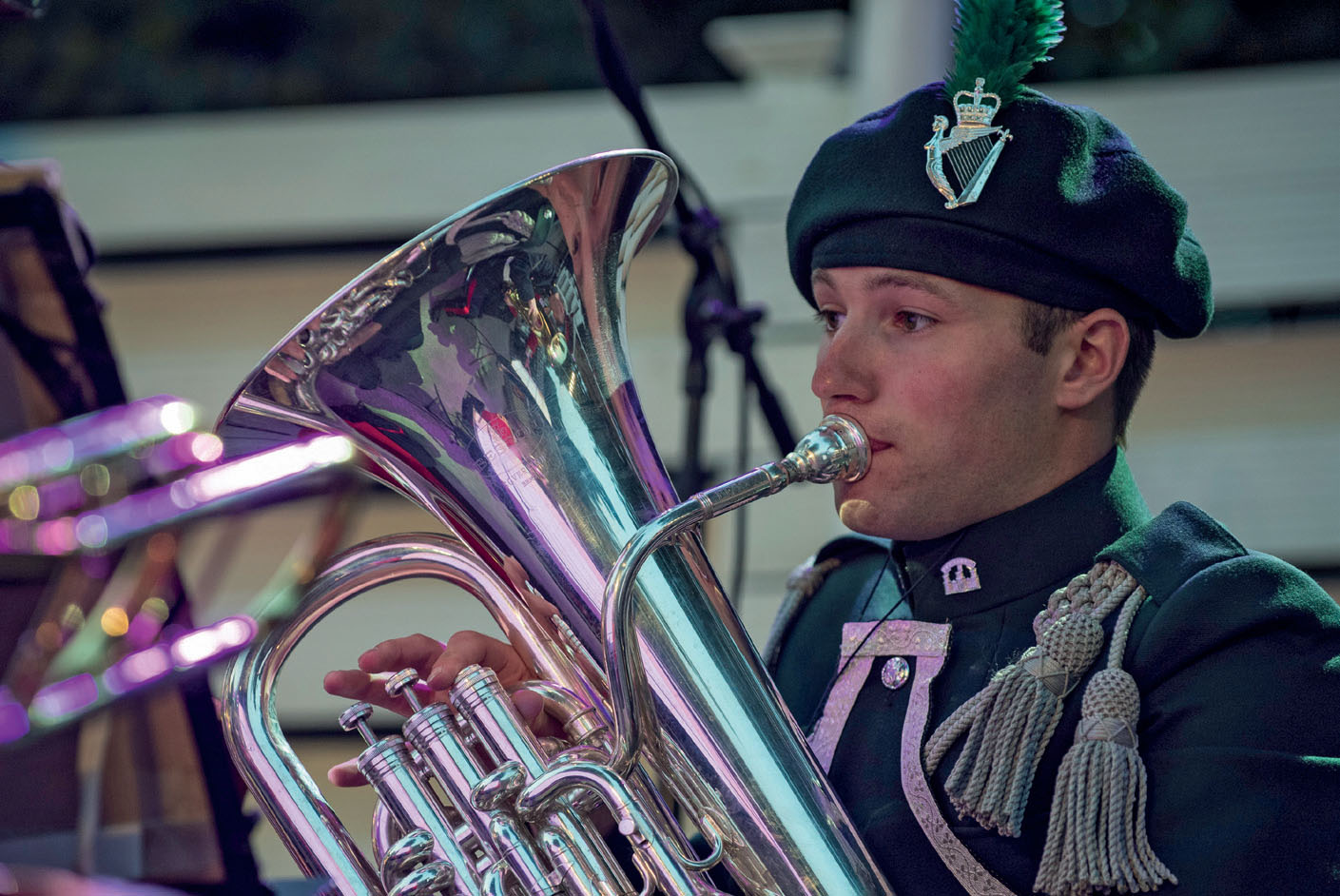
‘It pays to be an Army Musician.’ This is the strapline emblazoned on the British Army's website. Whether you choose to go full time and full regatta, or part time, alongside your other endeavours, a career as a musician in the military – the British Army, Royal Air Force and the Royal Marines – is one of the few choices left where musicians are guaranteed a steady – and decent – income.
When music students reach a certain point in their education, the advice is usually to go to university and/or get a ‘real’ job. In my own experiences of being both a student and a teacher myself, the military has never come up as an obvious viable option for a career within music. In fact, it wasn't until my third year at music college, when a group of military musicians came in and gave a presentation, that I first realised this was even a possibility. The intake from my particular year (the class of 2012) was considerable. However, many students were put off, as it seemed that only full-time roles were available, meaning graduates would have to choose between being portfolio musicians or military musicians, rather than the combination of both.
This is where many are mistaken. The British Armed Forces is one of the largest employers of musicians in the UK. While most civilian musicians have to endure hard graft to see even a glimpse of travel outside of their homeland, Army musicians are paid to perform at famous, high-profile events at home and all over the world. But this isn't limited to full-time personnel; a part-time career path is also available through the Corps of Army Music – also know as the Army Reserves.

In the present day, the Corps of Army Music is made up of 22 Regular and 19 Reserve bands that play everything from military marching music to jazz and contemporary; the Corps constantly requires musicians with a wide range of specialisms. What's key to remember is that unlike the full-time personnel, the reserves are able to combine their positions with other career commitments, which makes it perfect for the portfolio musician, a student alongside study, or for a ‘civilian’ (a person not in the military) to undertake a part-time role alongside their regular job. Both part-time or full-time routes ensure a pensionable career right up to the age of 55, twinned with opportunities to progress through promotion, and, as such, increase earnings.
The entry requirements are similar to those required by any UK music college. You must have Grade 8 ability on your chosen instrument, alongside good theoretical knowledge (another reason why it's important to get Grade 5 theory under the belt). To demonstrate this ability, an audition takes place, in front of a Corps of Army Music panel. In addition, physical fitness is key, as well as a relatively clean bill of health. This is crucial because applications travel through the central army system, and are treated in the same way as any other function and discipline in the military, in case anyone is required for future combat duty. A relatively mild, but lifelong, case of asthma squashed my Royal Air Force ambition at 28-years-old, but this isn't to say that this would be the case for everyone. Every application is dealt with differently.
Training
But let's move forward. You're in! What happens next?
Unlike the full-time military personnel, who do their basic training in a block of time ranging anywhere from six to twelve weeks, basic training for the reserves takes place over a series of evening, weekend and residential courses. This basic training – Phase 1 training – is designed to give a good introduction into the fitness and skills required by the military.
Once the basic training is over, music-based training begins – also known as Phase 2 training. While the Army Reserve Bands are not part of the Corps of Army Music, their musicians are trained by the Royal Military School of Music. They are still under the direct command of their parent corps or regiment. This training builds on current skills and knowledge, working to create a better performer and musician and ultimately preparing for reserves life.
Payment
You'll get paid a day rate according to your rank, starting from £37.47 in training and rising to £46.42 per day once qualified – also known as being ranked as a Private. This includes being paid for weekly drill nights. Plus, if you complete all of your annual training days, you're entitled to a tax-free lump sum called a bounty.
Commitment
Let's not be mistaken, every job comes with a minimum commitment. The minimum requirement here is 16 days in camp training inclusive within a 27-day commitment, on an annual basis. As a musician, duties such as rehearsals, concerts and public engagements generally take many over that minimum requirement. However, it's up to the individual reserve recruit to decide which engagements are taken on, unlike the full-time recruits, who are duty-bound to every engagement that their regiment takes part in.
 The Army Reserves are a great addition to any portfolio career, whether you are a teacher, an undecided student or an early retiree looking to do something different. © CORPORAL DANIEL WIEPEN/MOD CROWN
The Army Reserves are a great addition to any portfolio career, whether you are a teacher, an undecided student or an early retiree looking to do something different. © CORPORAL DANIEL WIEPEN/MOD CROWN
Richard Llewellyn, UK Education Manager (Steinberg) and trumpet player
I joined the Band of the Royal Yeomanry (a Reserve Army Band) 30 years ago after leaving the Band of the 1st Royal Anglian Regiment (a Regular Army Band). Everything I do with the band (including rehearsals) is paid! I love being able to play regularly with a high-quality band and I enjoy the camaraderie. As a trumpeter I play a variety of gigs including fanfares in St Paul's Cathedral, at the changing of the guard at Buckingham Palace, and I've even played in the New Year's Day parade in Hong Kong.
Peter Lewis, trumpet student at Trinity Laban Conservatoire of Music & Dance
The Army Reserves provides me with an opportunity to regularly perform music and get paid. My instrumental teacher up until sixth form was previously in the Scots Guards and went into the reserves, and suggested it for me while I was studying in London. I'm also considering a full-time career as a military musician when I come out of music college so I thought this would be a good way of getting an insider view of what the military is really about.
Ted Everiss, retired from the British Army and woodwind/brass player
I have played music my whole life. When I was young, my Thursday night band shared rehearsal rooms with a Reserve Band. As we got older we got invited to play with the Reserve Band where the older members regaled us of stories about life in a regular Army Band, where they saw the world and got paid. I joined and saw the world too. I left the Regulars after 35 years’ service and I suppose it was in my blood. I missed the playing, so sought out my nearest Reserve Band – ten years later I am still there and enjoying it.








